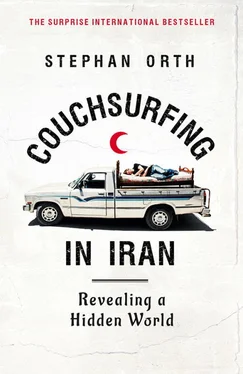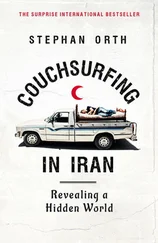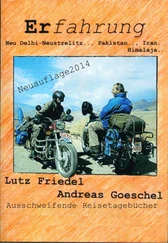
The neighborhood is well known for its propaganda art. DOWN WITH USA is written in screaming capitals on a wall near the former American Embassy. A couple feet away there is a mural of the Statue of Liberty with the glittering silver spiky crown perched on a skull. Next to it is a picture of the Capitol Building, with Israel’s flag flying above the cupola. I knew about this graffiti from reports about Iran; they are popular subjects for typifying Tehran. Most of these reports are about religious fanatics, plans to build an atomic bomb, and hate-filled tirades against America or Israel. In the rankings of countries with the worst image, Iran has been striving for the World Cup title for years.
“Welcome to Iran,” I hear a voice next to me say. The stranger in the suit doesn’t seem to fit the murals—he really means it.
A quick call to Yasmin; she doesn’t answer. I walk to the House of the Artists, just a few blocks away. According to the guidebook it is a good place to get in contact with local artists, and those are not the ones who paint the walls with anti-American slogans. Unfortunately, the museum is closed for the New Year celebrations, as is the adjoining café. I find a bench in the park, lean my backpack against it, and doze off.
From: Yasmin Tehran
Hi, i told you no problem with time, always welcome
She answers my text message in the afternoon, and I take a cab to the southern Eskandari Street. We shake hands. She is wearing a black top with a glittery silver Eiffel Tower motif and a baseball cap on top of her veil.
“How are you? Anything new?” she asks. I got to know Yasmin during my first Iran trip a year ago.
We turn into a small side street, go through a squeaking iron door into the forecourt, where two white Saipas are parked, then up the concrete staircase to the first story. I take my shoes off, hug Yasmin’s mother, hand over the box of marzipan, and put the luggage into my room. I know where everything is from my last visit.
Her mother is wearing a string top and no veil. As soon as the door is closed, Yasmin, despite having a male visitor, takes off her veil, revealing short dyed blond hair.
According to the official government figures, 99 per cent of Iranians are Muslims, but Yasmin’s family is not religious. At home she doesn’t have to behave as if there is a thick curtain at the living room window, excluding both light and curious gazes. I’m offered hot tea, nuts, and Chichak chocolate bars, with a wrapper closely resembling a Snickers. I feel at home. The Iranians are masters at making visitors feel as comfortable as possible.
The TV is broadcasting a speech by the Iranian leader Ayatollah Khamenei. The most powerful figure in the country is waving around his cue card, hollering into two microphones about how the Iranians shouldn’t kowtow to the Americans, the Yanks are stealing oil, something has to be done about it. Instead of using his cue card, he could just as well have read out the messages on the walls of the former U.S. Embassy. Without Ayatollah Khomeini next to him, he actually seems to be ever so slightly charismatic. But only ever so slightly.
“There’s always a speech like this on Fridays,” says Yasmin.
“Today’s Thursday.”
“It’s a repeat, so that we all remember that tomorrow we will get the same speech with different words.” And then to her mother: “Hey, come on, switch channels.”
Her mother obeys. First she switches to a program about the correct way to arrange roses and then to a music channel playing “G.U.Y” by Lady Gaga. The singer’s dress is white, but so scant that “color of innocence” is not what comes to mind. I ask Yasmin why Iranians hate the U.S.
“Not the Iranians—the government,” she replies. “Many young people dream of emigrating to America because it’s a free country. However, some people believe that the CIA secretly determines Iran’s future, as it has already done repeatedly in the past. During the presidential elections, time and again, rumors abound about America manipulating the results.”
“Then they did a pretty good job this time,” I quip.
During my last trip Mahmoud Ahmadinejad, whom a German newspaper dubbed the “Madman of Tehran,” was president. Now the moderate Hassan Rouhani has been in office for several months. In the background, Ayatollah Khamenei continues to pull the strings—a point that is often forgotten because he is rarely present on the international stage.
“Why do all Europeans think Rouhani is so great?” asks Yasmin.
“Because he’s a good speaker and seems pretty reasonable. At least compared to his crazy predecessor, who was quite capable of shooting himself in the foot at every UN General Assembly. You’re not convinced by him?”
“Nothing much has changed in the last year. The moral police are still active, prices rise, and the relationship to America hasn’t improved.”
“But there have been diplomatic breakthroughs—the sanctions have been relaxed, and for the first time in thirty-five years the Iranian and American leaders have been in telephone contact.”
“There’s been much talk and little action. Rouhani comes from the same clerical stock as Khomeini and Khamenei. He just pretends to be more modern and liberal. He is a master of fine words, but apart from that, he’s achieved precious little,” she answers.
Yasmin is thirty-one, a touch chubby, paints ladybugs on her nails, and can alternate between talking seriously and exploding into laughter within a split second. She longs for the trade restrictions to be lifted. Since Iran was barred from the SWIFT financial network in March 2012, the country has been practically cut off from international money transactions. And there have been less foreign imports, including essential medications, since then.
“I have a bone disease and am dependent on medication that isn’t available here. I hope that next year I can get a grant to study for my doctoral thesis in Germany. I just want to get out of this country.”
She has completed her studies as a software engineer and is now working on her master’s thesis in tourism management. Her main topic is the battlefields of the Iran-Iraq War and the stream of visitors there. Every year, millions of Iranians travel to the memorials. Her father could probably help her with the subject, as he was a naval officer. Just now he is on a trip to southwest Iran with a few other war veterans, visiting places where they fought.
I have to get on the Internet to write to a couple prospective hosts and to book a flight to Kish Island. The computer is in the room that is mine for the next couple days—two beds with floral bedspreads, a wooden closet, a chest of drawers crammed to the top with all sorts of odds and ends, no window. Normally, this is Yasmin’s room, but she has moved into her mother’s room.
Yasmin closes the Facebook tab on her browser. Officially, the website is banned in Iran. Still, I have never met an Iranian under thirty-five who isn’t on Facebook; they use proxy servers to access it. Yasmin helps me with the flight arrangements; domestic flights are not easy to book.
“Do you want to pay less and fly with a Fokker or pay more for a Boeing?” she asks.
“A Fokker is okay,” I answer.
As you read Persian from right to left, it seems to me that the times on the flight website are the wrong way around. The Fokker flight on Sunday, for instance, appears to depart at 15:10 and arrive at 13:15. She reserves a ticket for me that I can collect the day after tomorrow at the travel center.
“Do you want to visit a couple battlefields during your stay? We could go there together. In three weeks,” suggests Yasmin. The first day, the first change in plans. I accept the proposal immediately.
Читать дальше




![Stephan Orth - Behind Putin's Curtain - Friendships and Misadventures Inside Russia [aka Couchsurfing in Russia]](/books/415210/stephan-orth-behind-putin-s-curtain-friendships-a-thumb.webp)








